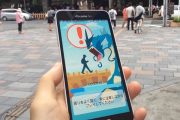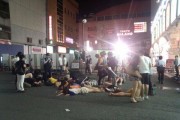Students at Kyoto University (Kyodai), one of the nation’s most prestigious universities are at the center of a controversy after they captured two plain-clothed police officers inside the university campus.
The police officers, both members of the Security Police whose mandate is usually to protect the government and its ministers, had entered the campus to report on potential a student backlash after two Kyoto University students were arrested at an anti-government demonstration in Tokyo a few days earlier.
The fact that police had entered a university campus without prior consent prompted many to think back to the postwar student protests. In particular, many recalled the 1951 “Popolo Incident”, where police were restrained by students from Tokyo University during a performance by the University’s Popolo Players.
From Mainichi Shimbun:
Kyoto University: Plain-clothed Policemen From 2nd Division of Security Police Surrounded By Students
At around twenty past midnight on November 4, there was a commotion at Kyoto University, Sakyō ward, Kyoto, when students temporarily boxed in two plain-clothed police offices from Kyoto Prefectural Police who had entered the campus without consent. There had been an agreement between the University and the Police from the perspective the autonomy of the university that when police officers enter the grounds of the University they are to give prior notice; however, this was not done. Kyoto University asked for an explanation from the police officers involved, they apparently issued a comment saying they “truly regret coming on campus without having given prior notice”.
According to Prefectural Police and Kyoto University, the officers who entered the campus were male officers in their 30s who belong to the second division of the security police. When they were discovered they were taken to a classroom, and confronted by more than twenty students. Following this, they were questioned for around three hours by faculty, including Associate Chancellor, Prof. Sugiman Toshio, on their intentions in entering the University campus. No one involved was injured.
On November 2, at a demonstration march in Tokyo, the Tokyo Metropolitan Police arrested Kyoto University students on suspicion of obstructing officers in the line of duty. On November 4, police were on watch having received information that there would be a protest movement in reaction to the arrests.
At the time, there were also other plain-clothed police officers in the area of the incident, who contacted the Prefectural Police, telling them “division members have been surrounded by students”. Anti-riot vehicles gathered in the area surrounding the University, and there was an atmosphere of confusion as dozens of anti-riot police emerged. The Kawabata Division of the Prefectural Police, under whose jurisdiction the campus falls, commented that “There was trouble between police officers and students, but we are still confirming the details”.
Regarding Police authority and the autonomy of the University, there is the “Tokyo University Popolo Incident” of 1952, when plain-clothed police offices infiltrated a public performance by the Tokyo University Popolo Players that was being held in the grounds of Tokyo University. It was claimed that students were guilty of violating the Law Concerning Punishment of Physical Violence Etc., for doing things such as taking the police officers’ notebooks. The legal battle went to the Supreme Court, and the judgement was uncertain due to the hearing was passed back to the Supreme Court, but in 1963 the students were handed a guilty verdict.
On Twitter, there were comments likening this recent incident at Kyoto University to the Tokyo University Popolo Incident. Furthermore, videos of people who seemed to be policemen being restrained and photographs of anti-riot vehicles awaiting orders in the area around the University were uploaded one after the other online. While there were a series of opinions critical of the police, with comments like “this is a serious infringement of the autonomy of the University”, there were also those who were critical of the students, saying “Obstructing officers in the line of duty? Aren’t they being confined?”
Moreover, there were also comments such as “Kyoto University was really a scary place after all. Those students should be studying!”; “The social climate is different from how it was back when the Tokyo University Popolo Incident happened, and I suppose the odds are against the students”. [Okazaki Hidetoo, Murata Takuya, Matsui Yuktaka]
Pictures from Naver Matome:
Comments from Twitter:
田中ふみお:
Even back when there were plentiful student movements in 1960 with the Anpo [US-Japan Security Treaty], there were lots of Kyoto University students who caught the eye of the old Secret Police and had their names put on the list. This incident makes me think of those days.
kykw(裏):
Wonder if something fun like this won’t happen at our university too…(someone else’s business).
けんとぉぉ↑↑ \177cm級/:
I only know about PoPoLoCrois.
And then and then?
めばちこめんちょ:
And what happens when they hand over the police officers to the police? If those officers were found to have been doing an undercover investigation then that’s breaking and entering. Aren’t undercover investigations illegal?
Arai Kaoru:
All the videos of the Kyoto University students fighting with the secret police are funny. The best thing is that even if they get filmed they can’t set in motion any charges of obstructing officers in the line of duty.
プロパ神ダ@鬼手仏心:
There are loads of pictures on Naver.
I’m looking forward to the statement from the Police.
era:
I was just wondering in what period of history did this happen. But nah, it was actually yesterday.
feita:
When I saw this I thought they were talking about November 4 years and years ago, but it was only yesterday!
冷凍パン:
Feel sorry for the people working at Kyoto University too.
重松大輔:
Back when I was a student, right in front of the campus Okuma Lecture Hall, for some reason there was a tako-yaki stand. I remember that the guy who ran it had pretty sharp eyes, so the stand used to be called “Security Police Tako-Yaki”. 笑. Wonder if he’s still there.
Kobayashi Isao:
There was quite a lot about this popping up on my timeline yesterday, but was it only me who kinda felt that seeing as it was Kyoto University this wasn’t really the kind of stuff that should be trending? Doesn’t this kind of thing happen much these days?
かわと11/2ボカロ新曲公開:
This actually happened!? I had no idea.
rashper:
So they think they have autonomy, but they really don’t.
It’s a university after all.
うえしん:
I had no idea that the autonomy of the university was so powerful. [netizen puns on “kyodai”, which is an abbreviation for Kyoto Daigaku (university) but sounds the same as the word “kyodai” (powerful)].
Takuya_Honma:
Of course staff and students are going to get angry if the police come in without permission. I think it’s only right that they responded, and I’m surprised that there are people out there who don’t think that.
帰ってきた☆水無月はいど:
Hah, I’m not even going to talk about those amateur secret police who got caught out, but it’s deplorable that there are still people like that at Kyoto University. Guess at the end of the day left wing is left wing.
古川 賢太郎:
1) Had they been spies they wouldn’t have been carrying ID cards. 2) It’s illogical that even though Kyoto University is a public national university, the police can’t enter it (if you don’t want the police coming in, then make it a private school) 3) If you are going to participate in a demonstration where there’s a chance you’ll be arrested then be prepared for that.















